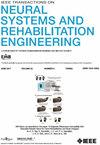Freeing P300-Based Brain–Computer Interfaces From Daily Recalibration by Extracting Daily Common ERPs
IF 5.2
2区 医学
Q2 ENGINEERING, BIOMEDICAL
IEEE Transactions on Neural Systems and Rehabilitation Engineering
Pub Date : 2025-07-31
DOI:10.1109/TNSRE.2025.3594341
引用次数: 0
Abstract
When people use brain–computer interfaces (BCIs) based on event-related potentials (ERPs) over different days, they often need to repeatedly calibrate BCIs every day using ERPs acquired on the same day. This cumbersome recalibration procedure would make it difficult to use BCIs daily. We aim to address the daily recalibration issue by examining across-day variations of the BCI performance and proposing a method to avoid daily recalibration. To this end, we implemented a P300-based BCI system designed to control a home appliance over five days. We first examined how the BCI performance varied across days with or without daily recalibration. On each day, the BCIs were tested using recalibration-based and recalibration-free decoders (RB and RF), with an RB or an RF decoder being built on the training data on each day or those on the first day, respectively. Using the RF decoder resulted in lower BCI performance on subsequent days compared to the RB decoder. Then, we developed a method to extract daily common ERP patterns from observed ERP signals using the sparse dictionary learning algorithm. We applied this method to the RF decoder and retested the BCI performance over days. Using the proposed method improved the RF decoder performance on subsequent days; the performance was closer to the level of the RB decoder compared to the original RF decoder. The method may provide a novel approach to addressing the daily-recalibration issue for P300-based BCIs, which is essential to implementing BCIs into daily life.通过提取日常通用erp,将基于p300的脑机接口从日常重新校准中解放出来。
当人们在不同的日子使用基于事件相关电位(erp)的脑机接口(bci)时,他们通常需要每天使用当天获得的erp重复校准bci。这种繁琐的重新校准程序将使日常使用脑机接口变得困难。我们的目标是通过检查BCI性能的跨日变化来解决每日重新校准问题,并提出一种避免每日重新校准的方法。为此,我们实现了一个基于p300的BCI系统,旨在控制家用电器五天。我们首先检查了BCI性能在每天重新校准或不重新校准的情况下是如何变化的。每天,使用基于重新校准和无需重新校准的解码器(RB和RF)对脑机接口进行测试,分别在每天或第一天的训练数据上构建RB或RF解码器。与RB解码器相比,使用RF解码器导致随后几天的BCI性能较低。然后,我们开发了一种利用稀疏字典学习算法从观测到的ERP信号中提取日常常见ERP模式的方法。我们将这种方法应用于射频解码器,并在几天内重新测试了BCI性能。采用该方法,射频解码器的性能得到了提高;与原始RF解码器相比,性能更接近RB解码器的水平。该方法可能为解决基于p300的脑机接口的日常重新校准问题提供一种新的方法,这对于在日常生活中实施脑机接口至关重要。
本文章由计算机程序翻译,如有差异,请以英文原文为准。
求助全文
约1分钟内获得全文
求助全文
来源期刊
CiteScore
8.60
自引率
8.20%
发文量
479
审稿时长
6-12 weeks
期刊介绍:
Rehabilitative and neural aspects of biomedical engineering, including functional electrical stimulation, acoustic dynamics, human performance measurement and analysis, nerve stimulation, electromyography, motor control and stimulation; and hardware and software applications for rehabilitation engineering and assistive devices.

 求助内容:
求助内容: 应助结果提醒方式:
应助结果提醒方式:


